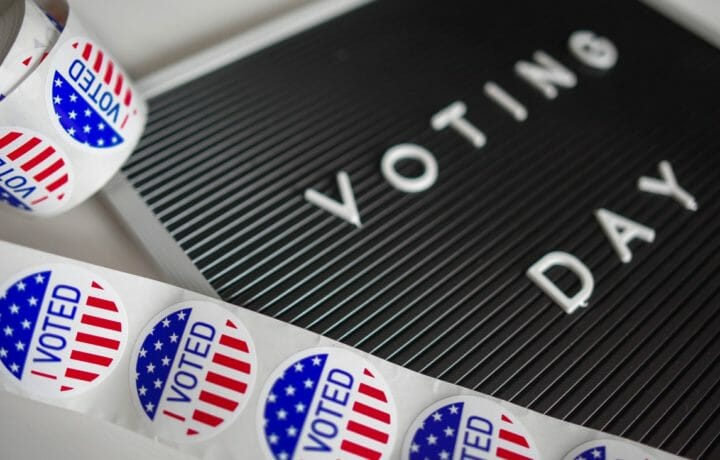Politics – like religion – is something that shouldn’t be discussed in polite company; yet in our great political divide it is hard not to speak up at times. The question becomes whether putting a political campaign bumper sticker on your car, or wearing a campaign hat or button will impact the security clearance process.
Generally, the answer is that it won’t.
“By and large, politics are irrelevant,” said Bradley P. Moss, Esq, an attorney specializing in security clearance related matters at the Law Offices of Mark Zaid.
The politics themselves are irrelevant – but that doesn’t mean there aren’t certain politically charged actions that may cause clearance or career issues.
“Displaying a political bumper sticker or campaign attire should have no impact on one’s ability to obtain or retain a security clearance, so long as the activity does not violate the Hatch Act or agency policy,” explained ClearanceJobs contributor Sean M. Bigley, Esq., partner at Bigley Ranish, LLP.
“Unfortunately, there are bad apples in the personnel security field just like anywhere else, and we have seen cases where politics have seemingly infected adjudicative decisions,” Bigley told ClearanceJobs.
Are You Now or have you Ever Been…
Regardless of who is the resident of the White House or which party controls congress, being in the “opposition” party won’t impact your clearance. That includes proclaiming support for the Green Party, Libertarian Party or even Socialist Party.
“It shouldn’t be much of a problem, if any,” noted Sean C. Timmons, managing partner at Tully Rinckey PLLC.
“Where it is a problem is if it is an extremist organization,” Timmons told ClearanceJobs. “If the group advocates the overthrow of the government than that would certainly be a problem. This would include groups such as the Nazi Party or similar organizations.”
Membership in some fringe political groups could also be a problem.
“This is where it gets a bit tricky,” added Bigley. “The freedom of association is an implicit part of the Constitution’s First Amendment, meaning that an individual cannot be discriminated against or persecuted by the government simply because of their beliefs or affiliations. On the flip side, a security clearance is a privilege – not a right – and the government has near total discretion in granting access to classified information.”
How far that ‘near total discretion’ extends is actually an open question legally, explained Bigley.
“Could the government deny someone a security clearance for being an avowed socialist, communist, or anarchist,” he pondered. “Most likely ‘yes’, although the question probably turns on how the individual advocates bringing about that change. Being a member of an organization that advocates overthrowing the U.S. government by force is definitely a ticket to being denied a clearance – hence why they ask the question on the SF-86. Being a ‘bro for Bernie’… probably not so much.”
Terrorist Organizations
It goes without saying that any group that has been labeled a “terrorist organization” would be a serious problem. The USA Patriot Act defines acts of domestic terrorism as: “(A) involve acts dangerous to human life that are a violation of the criminal laws of the United States or of any State; (B) appear to be intended – (i) to intimidate or coerce a civilian population; (ii) to influence the policy of a government by intimidation or coercion; or (iii) to affect the conduct of a government by mass destruction, assassination, or kidnapping; and (C) occur primarily within the territorial jurisdiction of the United States.”
Even groups not recognized as a terrorist organization could still be a problem.
“Antifa could be a problem under the current administration because of its assaulting of the police, assaulting of ICE agents and damage to property,” said Timmons. “The Trump administration could declare that Antifa and other groups should be classified as a terrorist organization, so I see Antifa as being a problem that is no different from the Ku Klux Klan.”
Past Meetings and Associations
Those who may have attended a meeting of a fringe political organization shouldn’t see that as a problem, however.
“Attending a private meeting alone could be multifaceted,” said Timmons. “There are many reasons you could have gone to the meeting; you were there to please a spouse, you’re writing a book, learning the group’s history or another reason. Mere participation at a political party meeting isn’t a problem.”
Where the line could be crossed is if your involvement was more than just attending a meeting.
“Active involvement might require disclosure, and this could include recruitment or even speaking at the meeting,” added Timmons. “If I simply went to a meeting however, it isn’t something that I would think needs to be disclosed.”
As with religion, most of the politics can be left unspoken, in other words.
“I would never advise clients to volunteer this type of information unless it is required to honestly answer a question on the SF-86 or one posed by federal investigators,” explained Bigley.
In many cases, past attendance and even membership can be left in the past.
“It’s not something asked about in the security paperwork or the background investigation, with a limited exception,” said Moss.
“That exception concerns association with an organization dedicated to terrorism or the violent overthrow of the U.S. Government,” Moss told ClearanceJobs. “Aside from that, being conservative or liberal simply is not part of the equation for a clearance determination. That is more a hiring issue.”




